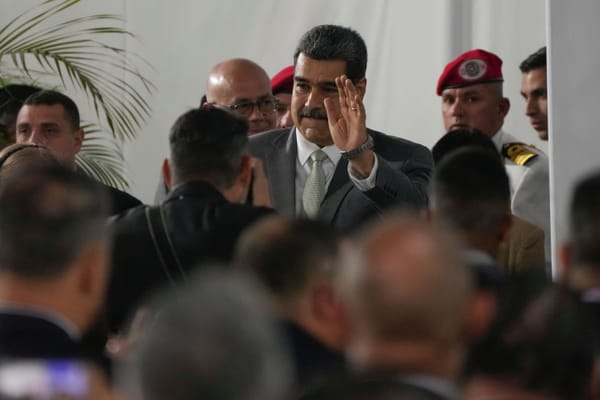On Sunday, Venezuelans voted on a referendum asking whether the Guyanese-administered territory of Esequibo, which borders Venezuela, should be governed from Caracas. The region comprises approximately 60 percent of Guyana’s de jure territory, as well as the bulk of the country’s newfound oil reserves, including most of the prized Stabroek oil field. As with the disputed Falklands Islands, the quarrel goes back to the colonial era. Like Argentina, Venezuela argues that the territory was wrongfully acquired by imperial Britain during the early 19th century; hence, the territory rightfully belongs to the Bolivarian Republic. In a further escalation of tensions, on Tuesday, President Nicolás Maduro announced the creation of a special military zone meant to defend the Esequibo.
The moves come amid a cooling of relations between the United States and Venezuela. In October, the Biden administration, in conjunction with the Venezuelan opposition, announced a partial and temporary waiver of sanctions against Venezuela’s oil and mineral sector for six months as part of a rapprochement negotiated in Barbados. Days later, the opposition held presidential primaries that ratified the nomination of María Corina Machado, who is currently barred from assuming elected office—a condition the regime is meant to lift under the terms of the sanctions agreement.
The vote on the Esequibo is a response to October’s opposition primaries. It serves the dual purpose of gauging Chavismo’s electoral muscle while distracting from the government’s failings. In the lead-up to the vote, Venezuela’s armed forces conducted a range of military exercises near its disputed border with Guyana, prompting alarm in Washington and throughout the region. Notably, Brazil’s president, Lula da Silva, an otherwise friendly neighbor to the regime, has expressed concern, going so far as to station troops near his country’s borders with Guyana and Venezuela in hopes of deterring an incursion.
Outside of the Bolivarian Republic, Venezuela’s armed forces are commonly viewed as a laughingstock. But it is also worth remembering that Guyana—a nation of 800,000 people—has no military to speak of, and the Esequibo itself is mostly unpopulated. If or when an invasion will occur is anyone’s guess, but the immediate upside for Maduro is clear. A climate of war may allow him to saber-rattle his way to victory over the opposition. Alternatively, an invasion or state of emergency could provide a convenient excuse for him to suspend presidential elections outright.
Washington had previously issued stern warnings to the regime that sanctions relief depended on Venezuela’s willingness to lift suspensions on opposition candidates and release political prisoners by Nov. 30. To date, Caracas has offered only the meekest of concessions: releasing five political prisoners since October and announcing just hours before the deadline that the opposition could contest candidate suspensions until Dec. 15.
“The critics of sanctions relief were correct.”
Having lauded the sanctions agreement as a welcome piece of foreign-policy realism, I now must admit that the critics of sanctions relief were correct. The Maduro regime’s behavior has worsened, and the Biden administration has offered only the most tepid support to the opposition. Because of its inaction, the White House has no one to blame but itself. Had the administration revoked some or all of the licenses granted to Venezuela’s state firms on or before Nov. 30, it is conceivable that the regime may have abided by its commitments and avoided belligerence against Guyana.
An enemy can never be trusted—except to act in his own self-interest. Through the Barbados agreement, the Biden administration granted itself considerable leverage over a state that has desperately sought sanctions relief for the better part of a decade. But by failing to hold Venezuela to the agreement’s terms, Team Biden has granted an avowed enemy of the United States a blank check.
What explains the Biden administration’s approach? Perhaps the White House is more interested in lowering gas prices ahead of next year’s election than it is in fortifying Venezuela’s democratic opposition. Then again, the White House could ignore climate activists and further boost production at home. Another factor may be pressure from multinational oil companies. Since October, the likes of Repsol and Shell have rushed to Venezuela to recover past debts and secure lucrative contracts with the regime. These firms seem to believe that sanctions relief is here to stay. It may well be that the electoral stipulations of the Barbados agreement served as nothing more than cover for the interests of the supermajors.
Whatever course the administration charts on Venezuela at this point, it has essentially guaranteed itself a humiliation.
